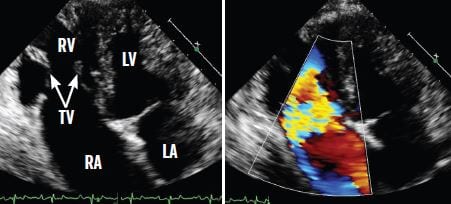Tricuspid Valve Dysplasia in Dogs

What is tricuspid valve dysplasia (TVD)?
- Tricuspid Valve Dysplasia is an uncommon congenital heart defect accounting for approximately 7% of all heart defects in dogs and is rare in cats.
- It is more commonly seen in Labrador Retrievers, Irish Setters, Great Danes, and German Shepherds, although any breed can be affected.
- It is a malformation of the tricuspid valve and its associated supporting structures that assist in proper valve closure. The tricuspid valve, or right atrioventricular valve, separates the right atrium from the right ventricle.
- TVD results in a lack of complete valve closure leading to a backflow of blood (regurgitation) up into the right atrium.
- If the regurgitation is severe enough, the right side (right ventricle and right atrium) of heart becomes enlarged.
- As the right side of the heart progressively increases in size, right sided congestive heart failure can occur. Fluid can accumulate within the abdominal and/or chest cavity as a consequence of right sided heart failure.
How is TVD diagnosed?
- A preliminary diagnosis may be made by your family veterinarian based on breed, physical exam, and x-ray findings.
- Often a heart murmur noted during a puppy’s first routine veterinary visit is the first indication of a problem, however, some animals may go unrecognized until they develop an arrhythmia (irregular heart rhythm) or clinical signs of heart failure.
- An echocardiogram (ultrasound or sonogram of the heart) performed by a veterinary cardiologist provides a definitive diagnosis and information about the severity of the defect, the degree of heart chamber enlargement, and presence of other defects.
How is TVD in dogs treated?
- Therapy is usually not instituted until signs of right sided heart enlargement are present.
- Medical therapy is aimed at improving quality of life, delaying the onset of congestive heart failure, and controlling fluid accumulation once heart failure has developed.
- Occasionally, a simple in-office procedure is required to remove excess abdominal fluid. This provides immediate relief to any uncomfortable abdominal distention.
What is the prognosis?
- Dogs with mild TVD live normal lives, often without medical intervention.
- Dogs with severe Tricuspid Valve Dysplasia often develop congestive heart failure within the first several years of life, however, recent advances in medications can provide good quality of life for many months and even years beyond the onset of symptoms.
